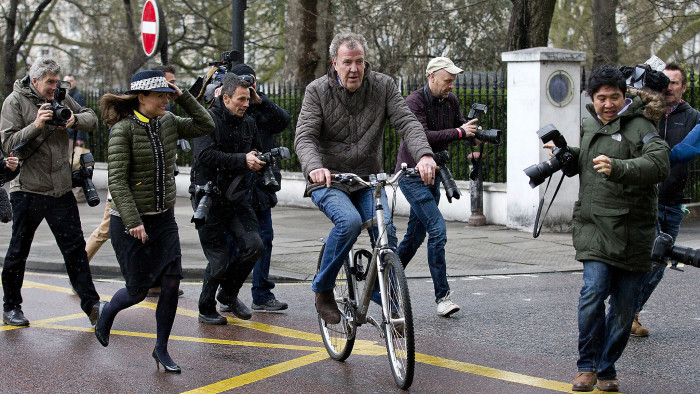Embarrassment awaits when top talent becomes the problem

Roula Khalaf, Editor of the FT, selects her favourite stories in this weekly newsletter.
Never work with children and animals, they say. In the television industry, however, there is one group that you cannot avoid working with — the talent. The proof of this can be found in the fact that two of the BBC’s big name talents have ended up in hot water this year.
First, Jeremy Clarkson, lead presenter of motoring show Top Gear, verbally and physically abused a producer. Then Alan Yentob, the creative director of the BBC, hit the headlines for his dealings outside the corporation as chair of collapsed charity Kids Company.
For the BBC — Britain’s public broadcaster, already battling political scepticism — the events have been an unwelcome reminder of the risks of employing some of the UK’s most mercurial characters.
The Clarkson episode proved the easier to resolve. The presenter, who had already been given a final warning, was told in March that his contract would not be renewed. “There was a sense that he’d come to the end of his road at the BBC for several reasons,” says Nigel Walley, managing director of Decipher, a media strategy consultancy. The incident with the producer “was used as an excuse to take a decision that they’d previously shunned”.
In the aftermath of this outcome, some commentators argued a number of points: that Mr Clarkson was a one-off talent; that the BBC had failed to manage his eccentricities correctly; and that the corporation would struggle to replace the revenues from Top Gear, which is one of its most profitable shows internationally.
In retrospect, Mr Clarkson’s exit has had benefits for both sides. He and his co-presenters, Richard Hammond and James May, are set to multiply their earnings as part of a $250m deal to make programmes for Amazon.
“It looks like he’s going to earn more money from that punch than Evander Holyfield [former world heavyweight boxing champion] made from most of his,” says Mr Walley of Mr Clarkson exit from the corporation.
For the BBC, that is not wholly inconvenient. It helps the corporation’s argument that it does not — as critics claim — pay too much to star performers. The BBC’s pay to “top end talent” — those earning more than £100,000 a year — has fallen 29 per cent in the past five years thanks to a “considerable cultural change”, according to a report by consultants Oliver & Ohlbaum.
Mr Yentob’s position, in contrast, continues to be a sore point for the BBC. The 68-year-old is one of the corporation’s stalwarts. He joined as a trainee 47 years ago and has built up strong relationships with actors and writers ever since.
At a tribute dinner last year, the journalist turned celebrity cook Nigella Lawson described him as “the last intellectual at the BBC”. Mark Thompson, the former director-general of the BBC, said that Mr Yentob was one of the few executives who did not disappear in a crisis.
But events at Kids Company have raised many questions for Mr Yentob, a director of the charity since 2003. Kids Company, which ran outreach centres for deprived children in London and Bristol, closed its doors in April, despite receiving a £3m grant from the government days earlier.
The BBC Trust, the broadcaster’s oversight body, is looking at whether Mr Yentob compromised the BBC’s editorial independence by speaking to journalists who were reporting on Kids Company’s collapse. The broadcaster has said he is entitled to speak to journalists as a representative of the charity.
Mr Yentob’s defence of Kids Company’s management has placed him in the public eye. He told a select committee of MPs that accountants PwC had found there was “not much substance” in allegations made against Kids Company by former employees.
The story has run since August, occupying Mr Yentob, who is meant to be a key figure in negotiations over the renewal of the BBC’s charter and licence fee funding. “It is difficult to see how he can focus, given the real questions over his management and the personal difficulties of being scrutinised in his role at the Kids Company,” says Claire Enders, a media analyst.
That is particularly crucial given Mr Yentob’s salary. He earns £168,300 as the BBC’s creative director; he also earns a reported £150,000 as presenter of the arts series, Imagine. Newspapers regularly report on his expense claims, which are publicly available.
“He is the worst example of the entitlement culture inside the BBC,” says Mr Walley, of consultants Decipher. “His address book has value, but at some point the trade-off with his toxicity takes over.”
Whether Mr Yentob follows Mr Clarkson out of the BBC remains to be seen. In some ways, the differing tribulations of the two men are noteworthy because of their rarity. Gone are the days went actors and presenters regularly appeared drunk on live television. Some see increased risk aversion at the BBC, which was badly burnt by an inflammatory 2008 prank involving presenter Jonathan Ross and comic Russell Brand.
For those with a love of mischief, however, there is some hope. Mr Clarkson’s replacement, Chris Evans, is himself a maverick who was sacked from a commercial show after failing to turn up for five consecutive days. Fittingly, he started planning for his Top Gear show in a pub.
Comments